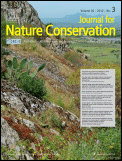
JOURNAL FOR NATURE CONSERVATION
metrics 2024
Bridging Theory and Application in Landscape Conservation
Introduction
JOURNAL FOR NATURE CONSERVATION, published by Elsevier GmbH, serves as a pivotal platform for the dissemination of applied and theoretical research in the fields of ecology, nature, and landscape conservation. With an ISSN of 1617-1381 and an E-ISSN of 1618-1093, this esteemed journal has earned a notable reputation, ranking in the Q2 category for both Ecology and Nature and Landscape Conservation in 2023. It is indexed in Scopus with commendable rankings, including #67/211 in Environmental Science - Nature and Landscape Conservation, highlighting its significance within the academic community. The journal’s diverse scope captures the complexities of environmental challenges and offers insights beneficial to researchers, conservationists, and policymakers dedicated to preserving biodiversity and facilitating sustainable practices. Situated in Munich, Germany, the journal has continuously contributed valuable knowledge since its inception in 1991, making it an essential resource for those committed to advancing conservation efforts on a global scale.
Metrics 2024
 0.67
0.67 2.20
2.20 2.50
2.50 62
62Metrics History
Rank 2024
Scopus
IF (Web Of Science)
JCI (Web Of Science)
Quartile History
Similar Journals
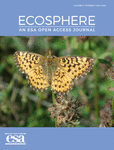
Ecosphere
Innovating research to illuminate ecological interactions.Ecosphere is a leading open-access journal published by WILEY, dedicated to advancing research in the fields of ecology, evolution, behavior, and systematics. Established in 2010 and headquartered in the United States, this innovative journal provides a platform for the exchange of cutting-edge scientific knowledge and discovery, fulfilling its mission to enhance our understanding of ecological systems and their interactions. With a prestigious impact factor reflecting its commitment to high-quality research, Ecosphere is ranked Q1 in both Ecology and Ecology, Evolution, Behavior, and Systematics for 2023, further solidifying its prominence in the scientific community. The journal's scope includes a wide array of topics related to environmental science, making it an essential resource for researchers, professionals, and students aiming to stay at the forefront of ecological research. It offers comprehensive open access options, ensuring that groundbreaking findings are readily available to a global audience, thus fostering collaboration and innovation in the field.

Journal of Wildlife and Biodiversity
Bridging science and conservation for all.Journal of Wildlife and Biodiversity, published by Arak University in Iran, is an Open Access journal that has been contributing to the fields of wildlife science and biodiversity since its inception in 2017. With an E-ISSN of 2588-3526, this journal serves as a vital platform for researchers, professionals, and students alike, dedicated to disseminating significant findings related to animal sciences, ecology, and environmental conservation. Despite its current Q4 ranking in various categories (Animal Science, Ecology, and Nature and Landscape Conservation) according to the 2023 metrics, the journal's commitment to advancing knowledge in wildlife and biodiversity remains unwavering. Although the journal's Scopus coverage has been discontinued since 2024, it continues to cater to a wide audience by promoting innovative research and fostering collaborations in the academic community, ultimately aiming to enhance understanding and conservation strategies for wildlife and their habitats.

Eco mont-Journal on Protected Mountain Areas Research
Advancing mountain conservation through innovative research.Eco mont-Journal on Protected Mountain Areas Research, published by the AUSTRIAN ACAD SCIENCES PRESS, UNIV INNSBRUCK, is a pioneering open-access journal dedicated to advancing knowledge in the fields of ecology, nature conservation, and the management of protected mountain areas. Established in 2009, this journal aims to publish innovative research, policy analyses, and management strategies that contribute to the sustainable development and conservation of mountain ecosystems. With a recognition of its importance within the environmental science community, Eco mont has been progressively indexed with Scopus ranks in various categories, reflecting its growing influence in the fields of nature and landscape conservation as well as ecology. As a vital platform for researchers, professionals, and students interested in the complexities and challenges of mountain area conservation, Eco mont provides immediate and widely accessible insights crucial for informed decision-making and policy formulation in mountainous environments.

BIOTA NEOTROPICA
Promoting High-Quality Research in Biodiversity and BeyondBIOTA NEOTROPICA is a prominent open access journal dedicated to advancing knowledge in the interdisciplinary field of ecology, evolution, behavior, and systematics. Published by REVISTA BIOTA NEOTROPICA since 2001, this Brazilian journal aims to provide a platform for high-quality research that fosters a deeper understanding of Neotropical biodiversity and its conservation. With an ISSN of 1676-0603 and an E-ISSN of 1676-0611, the journal has established its reputation within academic circles, ranking in the Q3 quartile for Ecology and achieving a respectable percentile of 57 in Scopus’s metrics. Operating from its headquarters in Campinas, SP, Brazil, BIOTA NEOTROPICA not only focuses on research dissemination but also encourages collaboration and exchange of ideas among scientists, students, and professionals in the field. The journal is particularly valuable for those looking to contribute to the understanding of ecological systems and promotes accessibility with its open access model.

Service Science
Navigating the Complexities of Service SystemsService Science, an esteemed journal published by INFORMS, stands at the forefront of interdisciplinary research, facilitating a deeper understanding of service systems and their impact on business and management. With an ISSN of 2164-3962 and E-ISSN 2164-3970, this journal has rapidly gained recognition since its inception in 2015, converging insights from various fields including Business and International Management, Management Science and Operations Research, Marketing, and Modeling and Simulation. The journal consistently ranks in the Q2 category across these sectors, reflecting its commitment to publishing high-quality research that influences both theory and practice. While not an open-access publication, Service Science offers a valuable platform for communication among scholars, practitioners, and students, fostering a dynamic environment for dialogue and innovation. The rigorous peer-review process ensures that only the most impactful studies are disseminated, making it a critical resource for advancing knowledge and practice in the field. With its headquarters located in Catonsville, Maryland, this journal is poised to contribute significantly to the evolving landscape of service-oriented research and practices.

Nature Conservation Research
Championing open access to vital conservation insights.Nature Conservation Research is a prominent open-access journal that has been dedicated to advancing the field of conservation science since its inception in 2016. Published by the SARANSK FOND PODDERZKI & RAZVITIA ZAPOVEDNYH in the Russian Federation, this journal serves as a vital platform for researchers, professionals, and students alike, providing critical insights into ecological and environmental issues. With an impressive impact factor and ranked in the second quartile across multiple categories—including Agricultural and Biological Sciences, Earth and Planetary Sciences, Ecology, and Nature and Landscape Conservation—Nature Conservation Research stands at the forefront of impactful scientific discourse. The journal not only aims to disseminate high-quality research findings but also seeks to foster collaboration and innovation in conservation practices globally. By ensuring open access to its content, it promotes widespread dissemination of knowledge, crucial in the fight against biodiversity loss and environmental degradation. Researchers and practitioners contributing to the journal will find themselves at the convergence of science and conservation efforts, paving the way for sustainable ecosystem management.
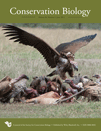
CONSERVATION BIOLOGY
Pioneering research in biodiversity and conservation.CONSERVATION BIOLOGY, published by Wiley, is a leading journal in the field of ecology and conservation, with a focus on disseminating high-quality research that addresses pressing environmental challenges. With a strong impact factor and categorized in the top quartile (Q1) across various relevant fields including Ecology, Evolution, Behavior and Systematics, and Nature and Landscape Conservation, the journal plays a pivotal role in advancing the scientific understanding of biodiversity and conservation practices. Since its establishment in 1987, CONSERVATION BIOLOGY has provided a vital platform for researchers, professionals, and students to share innovative findings and facilitate discussions surrounding ecological sustainability and conservation strategies. Although it is not an open-access publication, it ensures that a wide range of significant research is accessible to the global scientific community. The journal’s rigorous peer-review process and reputation for excellence make it an essential resource for anyone involved in the study of ecology and conservation.
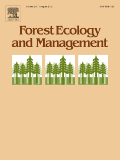
FOREST ECOLOGY AND MANAGEMENT
Connecting Research to Policy for Forest SustainabilityFOREST ECOLOGY AND MANAGEMENT is a premier peer-reviewed journal dedicated to the integral study of forest ecosystems and their management, published by Elsevier in the Netherlands. With an impactful presence in the field, this journal boasts a prestigious Q1 ranking in multiple categories, including Forestry, Management, Monitoring, Policy and Law, and Nature and Landscape Conservation as of 2023. It addresses key issues relevant to sustainable forest practices, conservation strategies, and environmental monitoring, making it a vital resource for researchers, practitioners, and policymakers alike. The journal is indexed with an impressive Scopus rank, placing it among the top tier of titles in Agricultural and Biological Sciences and Environmental Science. While it does not offer Open Access options, its rigorous review process and high visibility make it essential for those seeking to stay abreast of the latest findings and trends in forest ecology and management. Published continuously since 1976, FOREST ECOLOGY AND MANAGEMENT aims to foster interdisciplinary collaboration and advance knowledge critical to the stewardship of forest resources in an ever-changing global landscape.
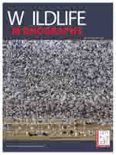
WILDLIFE MONOGRAPHS
Pioneering insights for a sustainable future in wildlife.WILDLIFE MONOGRAPHS, published by WILEY, is a prestigious journal dedicated to advancing the understanding of ecological and biological sciences with a keen focus on wildlife conservation and management. With an ISSN of 0084-0173 and an E-ISSN of 1938-5455, this journal has established itself as a leader in its field, ranking in the Q1 quartile for both Ecology, Evolution, Behavior and Systematics and Nature and Landscape Conservation in 2023. The journal's remarkable impact is underscored by its Scopus rankings—46th out of 721 in Agricultural and Biological Sciences and 17th out of 211 in Environmental Science, highlighting the journal's influential role in shaping research discussions and policy in wildlife management. Available in print and online, WILDLIFE MONOGRAPHS publishes comprehensive studies that inform practitioners, researchers, and students alike, fostering a deeper insight into biodiversity and ecosystem dynamics. Founded in 1981, the journal continues to evolve, contributing significantly to the scientific community through rigorous peer-reviewed articles that bridge the gap between theory and practical application in wildlife management.
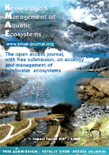
Knowledge and Management of Aquatic Ecosystems
Advancing Solutions for Sustainable Aquatic EcosystemsKnowledge and Management of Aquatic Ecosystems, published by EDP SCIENCES S A, is a premier open-access journal dedicated to the interdisciplinary study of aquatic ecosystems. With an ISSN of 1961-9502 and an impressive history since 1928, this journal serves as a vital resource for researchers and professionals in the fields of Ecology, Aquatic Science, Water Science and Technology, and Nature Conservation. The journal has consistently achieved high rankings, including a Q2 classification in multiple categories, which underscores its significant contribution to the evolving landscape of aquatic research. With access options that promote widespread dissemination of knowledge, Knowledge and Management of Aquatic Ecosystems aims to bridge gaps in research, policy, and practical applications, making it an invaluable asset for students, researchers, and policymakers aiming for impactful solutions in aquatic management and conservation.